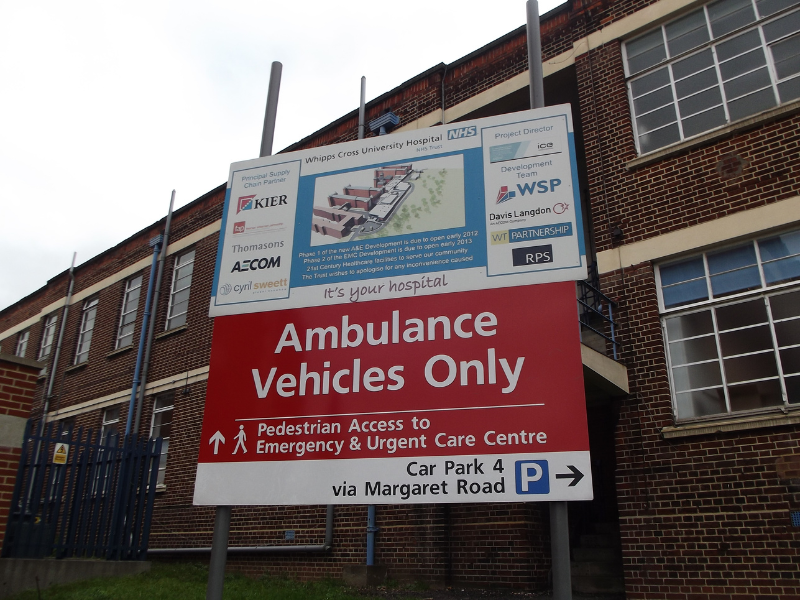Health inspectors said routine corridor care meant patients’ privacy and dignity was not always protected, reports Marco Marcelline
Whipps Cross Hospital says it is implementing “important changes” after being told it needs to improve safety, privacy and dignity for patients in its emergency department by the Care Quality Commission (CQC).
In its report, published on 16th December, the CQC said it had concerns around “poor flow” through the emergency department (ED), adding that inspectors were “not assured” that triage practices kept patients safe.
The report also found that the privacy and dignity of patients within the ED was “not always protected” while the number of staff who provide care for mental health patients was deemed “insufficient”.
The CQC report also found that time sensitive medicines were not being managed safely across the ED, while hand hygiene practices and staff understanding of the deteriorating patient were both rated “poor”.
It did however positively acknowledge the service provided at Whipps as “caring,” with patients reportedly feeling supported and listened to, and said the hospital was “well-led,” with staff reporting strong local support in their roles.
The rating comes amid data, released by Barts Health NHS Trust, that shows long waiting lists. At the end of October 2024, Barts Hospital Trust had 68 patients who had waited more than 18 months for treatment, and more than 4,200 people who’ve waited longer than a year.
Barts Health is the worst performing trust in London when it comes to time spent waiting in an ED; 1,199 people spent more than 12 hours waiting to be seen at Barts in 2024.
Alongside Whipps, the trust runs Mile End, Royal London, St Barthomolew’s and Newham General.
In response to the CQC report, Barts Health said: “”Whipps Cross Hospital has already implemented significant changes to improve patient safety, privacy, and dignity. While there’s more work to do, we are committed to sustained improvements including reducing overcrowding, accelerating care, and working with system partners to deliver high-quality, compassionate care.”
Barts said steps it had taken to improve include improving infection, prevention and control practices. This includes extra training and monitoring of standards, and a more effective management of medicine use. Privacy curtains have also been installed in corridor areas, with the trust stating it is working towards “eliminating corridor care altogether”.
To manage overcrowding the trust says it has limited the number of patients in the ambulance handover area and opened a new space for up to 17 patients awaiting admission.
Calvin Bailey, MP for Leyton and Wanstead said: “The state of Whipps Cross Hospital is a stark reminder of the urgent need for investment in our healthcare infrastructure that the government has recognised. The current conditions are unacceptable, with flooding, sewage leaks, and out-of-service lifts hampering the efforts of our dedicated healthcare professionals.
“It’s time for a comprehensive overhaul to ensure Whipps Cross can provide the high-quality care our community deserves.”
In July, Chancellor of the Exchequer Rachel Reeves had said that the government’s commitment to build 40 new hospitals including Whipps by 2030 was “undeliverable and unaffordable,” promising to “reset” the programme on a “sustainable footing.”
In October, health secretary Wes Streeting confirmed that Whipps Cross was indeed going ahead. The first phase of redevelopment, which includes a multi-storey car park, is currently happening.
Barts says a summit is due to take place this year on how the new hospital will be able to “harness the latest technology to provide the best possible care for patients”.
You can read more of the CQC’s findings here, and Barts’ full response here
Independent news outlets like ours – reporting for the community without rich backers – are under threat of closure, turning British towns into news deserts.
The audiences they serve know less, understand less, and can do less.
If our coverage has helped you understand our community a little bit better, please consider supporting us with a monthly, yearly or one-off donation.
Choose the news. Don’t lose the news.
Monthly direct debit
Annual direct debit
£5 per month supporters get a digital copy of each month’s paper before anyone else, £10 per month supporters get a digital copy of each month’s paper before anyone else and a print copy posted to them each month. £50 annual supporters get a digital copy of each month’s paper before anyone else.
More information on supporting us monthly or annually
More Information about donations
